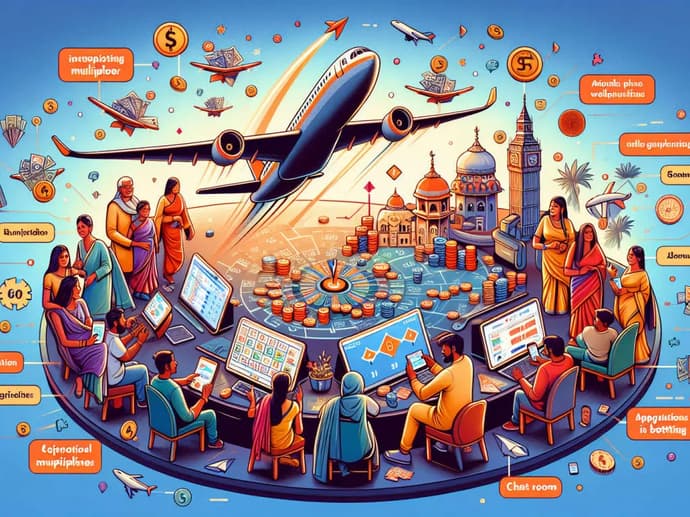
Aviator Game in India's Online Betting Landscape

India's online betting scene has witnessed a dramatic shift in recent years, with the Aviator Game emerging as an unexpected disruptor. This simple yet addictive crash-style game, where players bet on a multiplier that increases until the plane "flies away," has not only captivated a wide audience but also exposed unique challenges and opportunities in the Indian market.
The Unexpected Rise
While Aviator's simplicity and mobile-friendly design have contributed to its popularity, its success in India reveals deeper societal trends. The game's rapid rise highlights a growing desire for quick, accessible entertainment in a fast-paced society. This shift raises questions about the changing nature of leisure time in India and how traditional forms of entertainment are being replaced by digital alternatives.
Interestingly, Aviator's popularity has exposed a generational divide in attitudes towards online betting. Younger players view it as a form of entertainment, while older generations often perceive it as a vice. This divide has sparked intergenerational discussions about risk, money management, and the nature of gambling itself.
The Psychological Draw
Aviator's appeal goes beyond its simple mechanics. The game taps into the psychological concept of "near-misses," where players who cash out just before the plane flies away experience a rush similar to winning. This phenomenon, well-known in slot machine design, raises ethical questions about game design in the digital age.
Moreover, the game's social features have created unexpected support networks. Players often share strategies and offer encouragement in chat rooms, forming communities that extend beyond the game. While this can be positive, it also blurs the line between social interaction and gambling, potentially normalizing betting behavior.
Cultural Adaptation and Localization
Aviator's success in India has prompted interesting adaptations to suit local tastes. Some platforms have experimented with themed versions featuring Indian motifs or festivals. This cultural localization raises questions about the preservation of local gambling traditions in the face of globalized online games.
The game has also inspired new slang and memes within the Indian online community. Terms like "diamond hands" (holding on for high multipliers) and "paper hands" (cashing out early) have entered the lexicon of young Indian bettors. This linguistic evolution reflects how online games can influence language and communication patterns.
Economic Ripple Effects
Beyond the obvious impact on the betting industry, Aviator's popularity has had unexpected economic consequences. Local app developers are now creating Aviator-like games, spurring a mini-boom in India's game development sector. This has led to debates about brain drain, as talented developers choose to work on betting games rather than other software projects.
The game's success has also influenced marketing strategies across industries. Companies unrelated to betting have started incorporating Aviator-like elements in their promotional campaigns, raising questions about the gamification of marketing and its potential effects on consumer behavior.
Regulatory Quandaries
Aviator's rise has exposed gaps in India's betting regulations, particularly regarding skill-based games. The game's simple mechanics have reignited debates about what constitutes a game of skill versus chance. This legal ambiguity has led to calls for a more nuanced approach to gaming legislation that takes into account the complexities of modern online games.
Interestingly, some Indian states have considered using Aviator-like games for public policy purposes. Proposals have emerged to create similar games that promote financial literacy or encourage savings, raising ethical questions about the government's role in gamifying important life skills.
Technological Infrastructure Challenges
Aviator's real-time nature has exposed weaknesses in India's digital infrastructure. Issues like internet latency and server stability can significantly impact gameplay, leading to frustration and accusations of unfairness. This has spurred investments in edge computing and network optimization, benefiting not just gaming but other real-time applications as well.
The game's popularity has also stressed payment systems, revealing limitations in India's digital payment infrastructure. This has accelerated the adoption of new payment technologies and pushed for improvements in transaction processing speeds.
Social Impact and Addiction Concerns
While Aviator has created new social connections, it has also raised concerns about gambling addiction. The game's accessibility and quick play cycles make it potentially more addictive than traditional forms of betting. This has led to calls for more research into the psychological effects of crash-style games and their impact on vulnerable populations.
Some mental health professionals have reported seeing Aviator-related issues in therapy sessions, highlighting the need for specialized counseling services. This has sparked debates about the responsibility of game developers and platforms in promoting responsible gaming.
Gender Dynamics in Gaming
Aviator has unexpectedly challenged gender norms in India's betting scene. The game's non-aggressive nature and social features have attracted more female players, traditionally underrepresented in betting. This shift has led to discussions about gender-inclusive game design and marketing in the betting industry.
However, the increased female participation has also raised concerns about targeted marketing and the potential exploitation of new demographics. This has prompted calls for gender-specific responsible gaming measures and more diverse representation in industry leadership.
Future Implications
As Aviator continues to shape India's betting landscape, it raises questions about the future of entertainment and social interaction. Will crash-style games become a new form of social media? How will they influence risk perception and decision-making skills among young adults?
The game's success may also have long-term implications for India's tech industry. As more resources are directed towards gaming and betting platforms, there are concerns about brain drain from other critical tech sectors. This raises questions about national technological priorities and the balance between different areas of innovation.
Conclusion
The Aviator Game has not only transformed India's online betting landscape but also exposed deeper societal, economic, and technological issues. From challenging traditional notions of entertainment to exposing infrastructural weaknesses, its impact extends far beyond the realm of online betting.
As India grapples with the implications of this digital phenomenon, the story of Aviator serves as a case study in the complex interplay between technology, society, and regulation in the digital age. The game's journey in India offers valuable insights into the challenges and opportunities that arise when global trends meet local realities.

Elen Stelmakh on luova henkilö, joka on omistautunut edistämään pelikulttuuria artikkeleiden ja visuaalisen suunnittelun avulla. Päätoimisena EGamersWorldin kirjoittajana ja pelisivuston suunnittelijana Elen ei ainoastaan luo sisältöä, vaan myös antaa sille energiaa ja luovuutta.
 Satu: Reppu Crafting Resepti & opasTässä on opas siitä, miten askarrella reppu Hytalessa, joka laajentaa varastoasi suurempia seikkailuja varten Orbisissa.
Satu: Reppu Crafting Resepti & opasTässä on opas siitä, miten askarrella reppu Hytalessa, joka laajentaa varastoasi suurempia seikkailuja varten Orbisissa. Roblox Anime Guardians Koodit helmikuu 2026__Tutustu kaikkiin toimiviin Roblox Anime Guardians -koodeihin. Lunasta ilmaiset Mystic Coins, Trait Rerolls, Artifacts ja palkinnot.
Roblox Anime Guardians Koodit helmikuu 2026__Tutustu kaikkiin toimiviin Roblox Anime Guardians -koodeihin. Lunasta ilmaiset Mystic Coins, Trait Rerolls, Artifacts ja palkinnot. Yhdistyneen kuningaskunnan ulkopuoliset nettikasinot: Pelit, formaatit ja mitä pelaajat voivat odottaa.Yhdistyneen kuningaskunnan uhkapelijärjestelmän ulkopuolella toimivat online-kasinot herättävät huomiota lisensointimallien, pelisalkkujen ja myynninedistämistoimien erojen vuoksi....
Yhdistyneen kuningaskunnan ulkopuoliset nettikasinot: Pelit, formaatit ja mitä pelaajat voivat odottaa.Yhdistyneen kuningaskunnan uhkapelijärjestelmän ulkopuolella toimivat online-kasinot herättävät huomiota lisensointimallien, pelisalkkujen ja myynninedistämistoimien erojen vuoksi.... Bitcoin kasinot ja Crypto uhkapeli alustat UK pelaajilleKryptopohjaisista uhkapelialustoista on tullut huomattava osa maailmanlaajuisia nettikasinomarkkinoita.
Bitcoin kasinot ja Crypto uhkapeli alustat UK pelaajilleKryptopohjaisista uhkapelialustoista on tullut huomattava osa maailmanlaajuisia nettikasinomarkkinoita.





